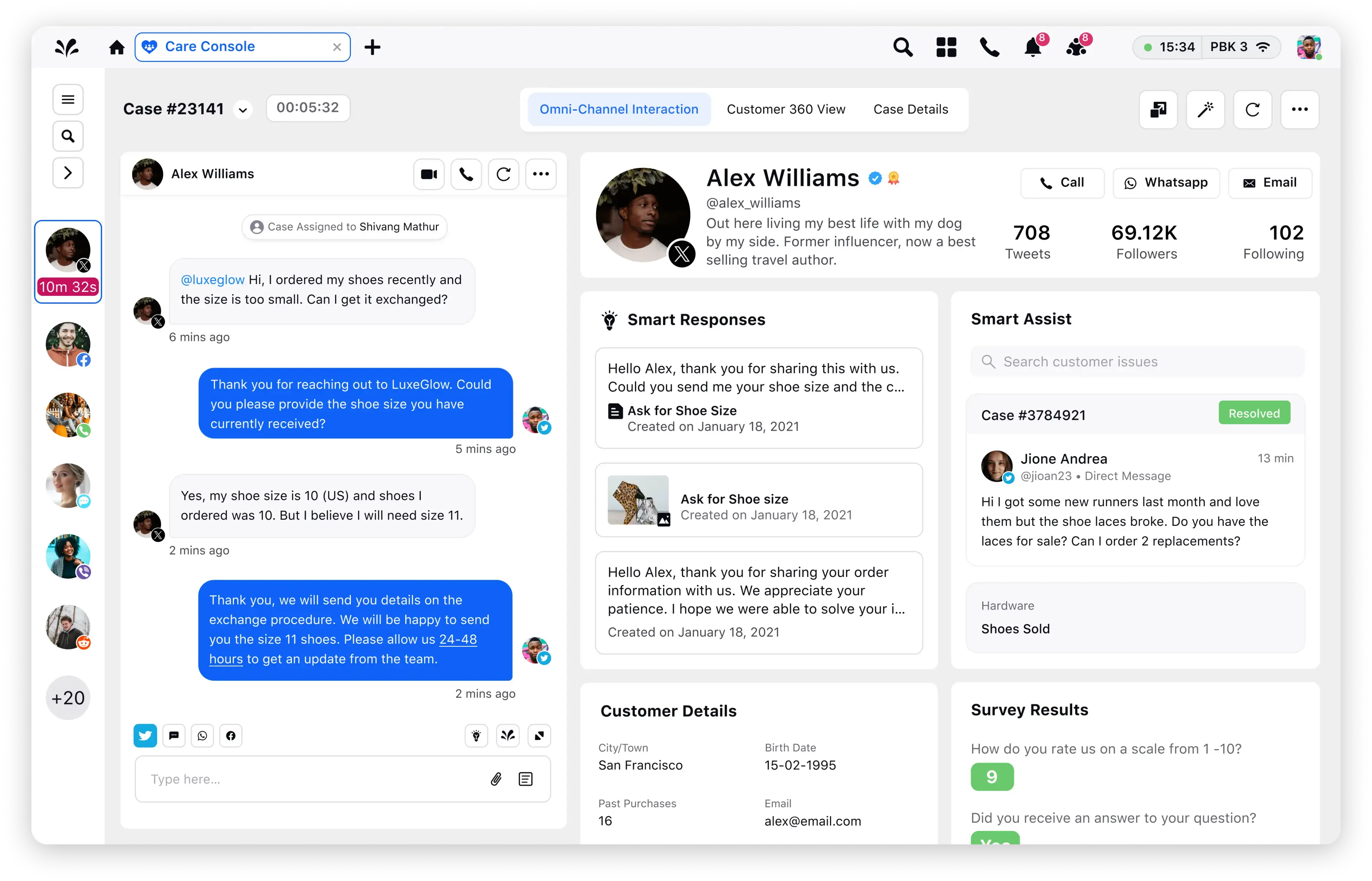The next generation of CCaaS is here
Digital-first customer service, enterprise-scale voice support. Redefine customer service with an AI-powered platform that unifies voice, digital and social channels. Power channel-less interactions and seamless resolution no matter the channel of contact.

Why is conversational AI needed in contact centers
It’s no secret that modern consumers prioritize speed, convenience, knowledgeable assistance and friendly service as the key elements of a great customer experience. These factors shape their perception of a brand and influence their loyalty.
But here's the catch: Out of the approximately 17 million contact centers worldwide, many are grappling with staffing shortages while striving to reduce labor costs, which can make up a massive 95% of their expenses. It's a challenging balancing act that demands innovative solutions.
Enter conversational AI.
It’s the game-changer that's transforming the customer service landscape. Unlike traditional chatbots, conversational AI is able to simulate human intelligence while driving speed and agility. It's an exciting leap forward, enabling businesses to complement and support costly human agents with cost-effective conversational AI assistants. Let’s discuss it in detail.
- What is conversational AI in contact center?
- Why is conversational AI essential in contact centers for businesses?
- Improve customer acquisition
- Reduce cost to serve
- Reduce customer churn
- Improve employee satisfaction
- Increase revenue per customer
- Best practices for conversational AI implementation in contact centers
- Enhancing customer engagement with conversational AI: A real-world example
- Conclusion
What is conversational AI in contact center?
Conversational AI is the application of advanced technologies like machine learning and artificial intelligence to develop virtual agents that can engage in natural conversations with users. Contact centers, in particular, benefit from conversational AI as it enables organizations to have meaningful and relevant interactions with customers.
Typically deployed through self-service mechanisms like chatbots and IVR systems, conversational AI excels at comprehending simple customer queries, understanding their intent and sentiment, and responding in a natural and human tone.
Now, picture this: a significant chunk of customer contacts revolves around mundane, routine information. Think order status inquiries, product availability checks or shipping information inquiries. These interactions often follow a predictable pattern of listen-search-retrieve, which can be time-consuming for live agents. On top of that, contextual information such as verifying caller identity or locating open orders further elongates the resolution process.
But guess what?
This is where automation steps in and saves the day. With the advent of virtual agents, businesses can automate these repetitive tasks, freeing up live agents to focus on more cognitive interactions. This does not keep them motivated but also drives more revenue for your organization.

Why is conversational AI essential in contact centers for businesses?
Organizations can leverage conversational AI in myriad ways, including but not limited to these seven broad use cases:
1. Omnichannel experience: Integrate multiple channels into one to give your customers an unbroken seamless experience at all touchpoints.
2. Self-service: Enable customers to resolve their queries independently whenever and wherever they want using knowledge base, communities and chatbots.
3. Contextual recommendations: Identify your customers’ pain points, needs and interests, and surface service and content recommendations to help your agents.
4. Response personalization: Provide customized offers, product recommendations and instant fixes in real-time based on case context.
5. Sentiment analysis: Understand the emotions of your customers across different channels as well as the collective sentiment of your brand.
6. Predictive sales lead: Give a conversion probability score to agents based on internal and external data helping sales to prioritize leads.
7. Conversational interfaces: Ensure bots can transfer a customer query to a human agent once it becomes too complex for them to handle. Moreover, the warm transfers happen with full context so agents can get right into resolution mode
Deploying conversational AI can help your organization get the following benefits.
Improve customer acquisition
Conversational AI enables your business to attract new customers by providing them with a seamless experience, enabling them to access information and make purchases effortlessly, regardless of time or location.
This unparalleled accessibility not only streamlines the customer experience journey but also amplifies conversion rates. Businesses can offer their customers with personalized:
- products to solve their unique pain points
- knowledge base recommendations to troubleshoot their issues
- pricing plans that cater to their needs and budgets
Reduce cost to serve
Deflecting customer interactions from traditional channels to AI-enabled platforms can result in serious cost savings for your business. Not only does it offer a short payback period, but it also comes with low integration costs and the potential for high returns on investment.
What's more?
AI algorithms are continuously learning and improving organically as customers engage with them. As a result, businesses can continuously enhance the quality and relevance of their customer service without breaking the bank.
Want to learn more? Watch this free webinar: Automate Customer Care with Conversational AI bots
Reduce customer churn
With conversational AI, you build a customer support system that empowers customers to resolve issues 24/7 on channels of their choice. When businesses demonstrate their commitment to providing exceptional service and ensuring customer satisfaction, it invariably builds trust and loyalty over time.
Furthermore, with advanced AI working in the background, you can gain valuable insights into your customers' feelings and sentiments, which allows you to tailor the support experience for every customer.
Improve employee satisfaction
Picture a world where mundane and repetitive tasks are seamlessly automated by AI-led conversational AI software. This breakthrough technology liberates employees from mundane routines, enabling them to focus on high-value, meaningful work that drives innovation and growth.
But that's not all – these virtual agents also act as invaluable support systems, providing employees with real-time guidance on how to best serve customers. This dynamic support ensures that employees consistently deliver exceptional customer experiences and never breach their SLAs.
Become a pro: How to use AI to boost agent productivity and morale
Increase revenue per customer
Conversational AI enables businesses to implement effective customer retention strategies. By analyzing customer data and behavior patterns, AI algorithms can identify opportunities for upselling, cross-selling, and personalized offers. These targeted interactions not only increase revenue per customer but also foster a sense of value and exclusivity, strengthening the customer's affinity for the brand and extending their lifetime value.
Also read: What is CCaaS and its benefits
Best practices for conversational AI implementation in contact centers
Implementing conversational AI in contact centers opens up a world of possibilities, but it also presents three unique challenges: data integration, scalability and comprehension of natural language. To overcome these challenges, here are some best practices you can implement.
1. Clear use-case identification
Start with a focused implementation by identifying specific use cases where conversational AI can add value. Whether it's addressing FAQs, providing basic issue resolution, or facilitating appointment scheduling, a well-defined use-case strategy sets the foundation for successful implementation.
2. Human-AI collaboration
Leverage the strengths of both human agents and conversational AI to provide a seamless customer experience. Implement conversational AI as a support tool that assists agents, enabling them to handle complex queries while maintaining a smooth transition when escalating interactions from AI to human.
3. Continuous training and improvement
Regular training and updates are crucial for conversational AI systems. Analyze customer interactions, gather feedback, and use insights to refine AI models and optimize responses. This iterative process ensures that the AI system continuously improves its accuracy, relevance, and performance.
4. Multichannel integration
Enable conversational AI across multiple communication channels, such as phone, chat, email, and social media. Consistency in responses and user experience, regardless of the channel used by customers, is vital for a seamless omnichannel experience.
Read more: A detailed guide on omnichannel customer experience
5. Compliance and data privacy
Implement conversational AI in compliance with data protection regulations and privacy guidelines. Safeguard customer data, obtain proper consent, and establish robust security measures to protect sensitive information and maintain customer trust.
6. Customer feedback and monitoring
Regularly gather customer feedback using customer surveys and use the insights to evaluate the effectiveness of conversational AI. Monitor conversations, track customer satisfaction metrics and use analytics to gain insights that drive continuous improvement.
Stay original and embrace these best practices to unlock the full potential of conversational AI in your contact center.
Enhancing customer engagement with conversational AI: A real-world example
If you’re still skeptical if conversational AI can indeed help improve customer engagement in your contact centers, the success story below might just help you make that leap of faith.
Aramex, known for its customized and innovative services in the logistics industry, decided to incorporate AI technology to streamline its global customer service operations. The company chose to consolidate its contact center for efficient and rapid customer service across major channels like live chat, email and WhatsApp.
Challenge: Aramex recognized the need to improve the efficiency and scalability of its digital customer service and thus turned to Sprinklr Service.
Solution: With over 400 customer service agents utilizing Sprinklr’s Conversational AI tools, Aramex could efficiently manage customer inquiries in multiple languages, all from a single dashboard. This integration enabled Aramex to transform its overall customer experience, providing fast and effective service on a global scale.
Outcome: By implementing Sprinklr's AI chatbots in multiple languages, Aramex was able to automate responses to common inquiries, resulting in positive customer experiences at a reduced cost compared to human interactions.
Read the full story here.
Conclusion
The global business value derived from AI is projected to experience a staggering average annual growth rate of 30%. But that's not all – the advantages go beyond just numbers. By embracing Conversational AI, organizations can witness a remarkable increase in mission-critical metrics like Net Promoter Score (NPS) and First Contact Resolution.
Not convinced?
Try Sprinklr’s Conversational AI first-hand for 30 days with a full-featured trial right way and watch your team’s productivity and customer satisfaction soar.
Frequently Asked Questions
Conversational AI in customer service refers to the use of advanced technologies like artificial intelligence and machine learning to create virtual agents that can have natural and interactive conversations with customers. The main goal is to enhance customer service experiences and make support interactions more streamlined.
Implementing conversational AI in contact centers can bring about certain challenges. Organizations may encounter the following key challenges:
- Data quality and availability
- Integration with existing systems
- Natural language understanding (NLU) and intent recognition
- Agent collaboration and transition
- Customer acceptance and adaptation
- Continuous improvement and training
Integrating conversational AI with existing systems in contact centers requires careful planning and execution, which can be broken into these steps:
- Identify integration points
- Define data flow
- Design conversational flows
- Develop custom integrations
- Ensure data security and compliance
- Test and iterate
- Provide training and support
Conversational AI breaks language and cultural barriers with NLP techniques that are trained on diverse datasets. With real-time translation you get seamless communication, and with continuous learning your conversational AI solutions improve their language comprehension and cultural awareness.
